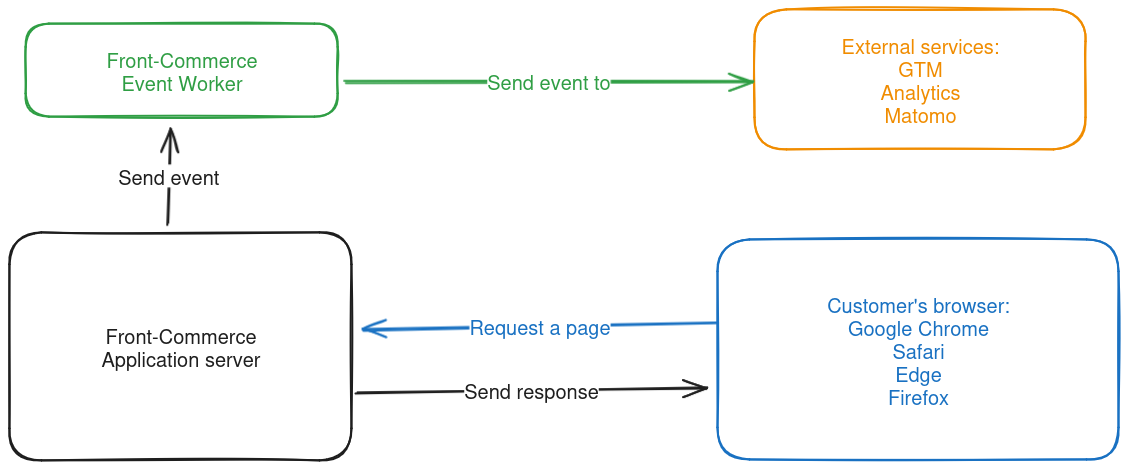Release: 3.3
Introducing Event-Driven Architectural Components, Extensions Features, Public Configurations, and Automatic session commit
We are pleased to announce the release of Front-Commerce 3.3, which lays the technical foundations for exciting features to come in the future. While the full set of features will be unveiled in 3.4, this release is packed with new architectural components that enable you to develop event-based features in your applications today.
In addition to the usual bug fixes, we have enhanced the core to improve your overall experience and prevent common mistakes detected from projects already using Front-Commerce Remixed. Finally, we have introduced several smaller but convenient features listed in the "Other changes" section below.
Let's dive in and explore what's new in this Front-Commerce release.
Infrastructure for Event-Driven use cases
We are pleased to introduce dedicated architectural components tailored for event-driven use cases.
Front-Commerce can now dispatch server-side events for business-critical actions, such as order placement, and you can register specific integrations to react to these events. This enables you to build event-driven workflows, such as sending a notification when an order is placed, or any other custom action you can think of.
This opens the door to a wide range of use cases, including some that we have already identified and are working on. We are excited to see what you will create with these new capabilities!
Here's a high-level overview of how these new features fit into an existing
Front-Commerce application:

Technically, the key components of this release include:
- A
ServerEventBusservice for dispatching server-side events from your Front-Commerce application - A Redis Stream event handler implementation allowing to centralize and process server-side events in a unified, scalable and reliable way
- A new
front-commerce workerCLI command to run dedicated event workers processing server-side events with registered integrations - An Integration API allowing to register runtime integrations to react to server-side events and notify external systems
- This release includes a single default integration allowing to notify remote webhooks (stay tuned for more integrations in future releases 🚀)
We have implemented a first use case to demonstrate the potential of these new
features. We have introduced an OrderPlaced event dispatched whenever an order
is placed.
Front-Commerce Cloud projects can use this right away! We already have all the required infrastructure in place to support this feature out of the box in your project. Please contact us if you want to enable this feature for your project.
To delve deeper into these updates, we encourage you to explore
our dedicated documentation about Server-Side Events.
If you have specific use cases that could benefit from these enhancements, we
would love to receive your feeback as we continue to refine and expand our
offerings.
Feature flags in extensions
We have added new options to the extensions for our supported eCommerce platforms. When registering the extension, you can now select the features you want to use.
A common use case would be to replace Magento CMS with Contentful, or run an Adobe B2B store without Negotiable quotes. In Front-Commerce 3.3, you can now register these extensions with deactivated features, which will remove any related GraphQL schema, configurations, or Remix routes.
Please read more about it in each extension's installation documentation:
As always, please let us know if you identify any use cases in other extensions that could benefit from this feature.
Public configurations
Public configurations are configurations that are exposed to the client. They are used in client-side code to configure the application or load remote resources.
Bid farewell to the specific environment variables prefixed with
FRONT_COMMERCE_WEB_. Public configurations are now using the unified
configuration you already know. All configurations available under the
config.public namespace are exposed to the client. One direct benefit of this
change is that you can update these configurations without having to rebuild
your application.
You can define public configurations using configuration providers, just as you
are used to doing for server-side configurations. To use them in your
client-side code, we introduced a new usePublicConfig() hook and a
getPublicConfig() function (when you're not in a React component).
We took this as an opportunity to simplify our existing codebase by exposing
shop information link any other public configuration.
We updated our theme to replace the deprecated withShop with the new
withPublicConfig HOC. We have also exposed all FRONT_COMMERCE_WEB_xxx
environment variables in the config.compatEnv to facilitate a progressive
migration and introduced a codemod to help you migrate your codebase so you'll
be able to use the new public configurations without any manual work! 🎉
Automatic session commit
Until now, Front-Commerce was following Remix's best practices for session
management.
As per Remix's recommendation,
developers had to manually commit the session and define the Set-Cookie header
in their routes responses.
Based on our experience from supporting customers working on Front-Commerce 3.x, we noticed that this manual process was error-prone and was often forgotten. This could lead to unexpected behaviors and bugs in the application.
We are pleased to announce that Front-Commerce now automatically commits the
session to the server when needed. This means that you no longer need to
manually commit the user session in your routes. The Set-Cookie header will be
automatically added to the response whenever the user session is modified.
We've simplified our codebase and have implemented a codemod to help you adapt
yours by removing redundant Set-Cookie headers from your routes too. We hope
this change will make your development experience smoother and make your
applications more reliable!
Other changes
Performance improvements
- Theme: implemented optimistic UI updates for coupon codes to improve perceived performance during interactions
Features
- Server: we added a new
/__front-commerce/healthendpoint, serving as a healthcheck. It can be used in cloud environments to ensure the application readiness. - Server: we introduced a new endpoint
/__front-commerce/metricsfor metrics tracking. This endpoint integrates with Prometheus to provide valuable insights into the application's performance and usage metrics. - Magento2: the inject role endpoint now supports body based token for
no-corscontext - Theme: the search results page is now available on its dedicated route
- Theme: an error is now thrown if a payment method isn't registered in payment flow, to ensure explicit configuration and avoid silent failures
- Compat: the FormV2 compat directory structure now mimics the directory structure of an usual theme
- DX: a new
front-commerce migrateCLI script now allows to run codemods on a project in a more streamlined way - DX: the
__front-commerce/debugroute now requires a security token in the URL for staging websites to prevent exposing sensitive staging details on publicly accessible environments - DX: we relocated our skeleton
/extensionsinto/example-extensionsso that it's more obvious that they can be removed when starting a new project - DX: we refactored global "atoms" stylesheets and merged them into a
singular one
_design-token.scss, imported bymain.scss
Bug Fixes
These bug fixes were also backported to 2.x when relevant.
- Theme: the cart and minicart states are now properly updated across the UI after cross-comoponent interactions
- Theme: deleting an item from the cart now only triggers the required revalidations
- Theme: fixed registration when subscribing to the
newsletter - Theme: fixed an issue that caused an automatic submission of the choose payment form when selecting a payment method or accepting the GSC
- Adobe B2B: RequisitionList loaders now always update the cart cache after modifying it
- DX: Sass CLI now works as expected when the app path contains spaces
Fixes from 3.3 have also been backported into previous minor versions. The following patch versions were released: 3.2.3, 3.1.3, 3.0.3, 2.28.1, 2.27.3, 2.26.8, 2.25.10, 2.24.11, 2.23.12, 2.22.14, and 2.21.13.
